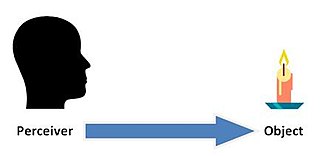
Existence is the state of being real or participating in reality. The terms "being", "reality", and "actuality" are often used as close synonyms. Existence contrasts with nonexistence, nothingness, and nonbeing. A common distinction is between the existence of an entity and its essence, which refers to the entity's nature or essential qualities.
Idealism in philosophy, also known as philosophical idealism or metaphysical idealism, is the set of metaphysical perspectives asserting that, most fundamentally, reality is equivalent to mind, spirit, or consciousness; that reality is entirely a mental construct; or that there is some higher "ideal form" of reality. Because there are numerous forms of idealism, it is difficult to define the term.
Solipsism is the philosophical idea that only one's mind is sure to exist. As an epistemological position, solipsism holds that knowledge of anything outside one's own mind is unsure; the external world and other minds cannot be known and might not exist outside the mind.

Subjective idealism, or empirical idealism or immaterialism, is a form of philosophical monism that holds that only minds and mental contents exist. It entails and is generally identified or associated with immaterialism, the doctrine that material things do not exist. Subjective idealism rejects dualism, neutral monism, and materialism; it is the contrary of eliminative materialism, the doctrine that all or some classes of mental phenomena do not exist, but are sheer illusions.

Meditations on First Philosophy, in which the existence of God and the immortality of the soul are demonstrated is a philosophical treatise by René Descartes first published in Latin in 1641. The French translation was published in 1647 as Méditations Métaphysiques. The title may contain a misreading by the printer, mistaking animae immortalitas for animae immaterialitas, as suspected by A. Baillet.

The Critique of Pure Reason is a book by the German philosopher Immanuel Kant, in which the author seeks to determine the limits and scope of metaphysics. Also referred to as Kant's "First Critique", it was followed by his Critique of Practical Reason (1788) and Critique of Judgment (1790). In the preface to the first edition, Kant explains that by a "critique of pure reason" he means a critique "of the faculty of reason in general, in respect of all knowledge after which it may strive independently of all experience" and that he aims to reach a decision about "the possibility or impossibility of metaphysics". The term "critique" is understood to mean a systematic analysis in this context, rather than the colloquial sense of the term.
In logic and philosophy, a property is a characteristic of an object; a red object is said to have the property of redness. The property may be considered a form of object in its own right, able to possess other properties. A property, however, differs from individual objects in that it may be instantiated, and often in more than one object. It differs from the logical/mathematical concept of class by not having any concept of extensionality, and from the philosophical concept of class in that a property is considered to be distinct from the objects which possess it. Understanding how different individual entities can in some sense have some of the same properties is the basis of the problem of universals.

In the philosophy of perception and philosophy of mind, direct or naïve realism, as opposed to indirect or representational realism, are differing models that describe the nature of conscious experiences; out of the metaphysical question of whether the world we see around us is the real world itself or merely an internal perceptual copy of that world generated by our conscious experience.
Philosophical realism – usually not treated as a position of its own but as a stance towards other subject matters – is the view that a certain kind of thing has mind-independent existence, i.e. that it exists even in the absence of any mind perceiving it or that its existence is not just a mere appearance in the eye of the beholder. This includes a number of positions within epistemology and metaphysics which express that a given thing instead exists independently of knowledge, thought, or understanding. This can apply to items such as the physical world, the past and future, other minds, and the self, though may also apply less directly to things such as universals, mathematical truths, moral truths, and thought itself. However, realism may also include various positions which instead reject metaphysical treatments of reality entirely.
Arthur Collier was an English Anglican priest and philosopher who wrote about the non-existence of an absolute external world.
This glossary of philosophy is a list of definitions of terms and concepts relevant to philosophy and related disciplines, including logic, ethics, and theology.
In epistemology and the philosophy of mind, methodological solipsism has at least two distinct definitions:
- Methodological solipsism is the epistemological thesis that the individual self and its states are the sole possible or proper starting point for philosophical construction. A skeptical turn along these lines is Cartesian skepticism.
- Methodological solipsism is the thesis that the mental properties or mental states of an organism can be individuated exclusively on the basis of that state or property's relations with other internal states of the organism itself, without any reference to the society or the physical world in which the organism is embedded.

The primary–secondary quality distinction is a conceptual distinction in epistemology and metaphysics, concerning the nature of reality. It is most explicitly articulated by John Locke in his Essay concerning Human Understanding, but earlier thinkers such as Galileo and Descartes made similar distinctions.
In epistemology, epistemological solipsism is the claim that one can only be sure of the existence of one's mind. The existence of other minds and the external world is not necessarily rejected but one can not be sure of its existence.
The simulation hypothesis proposes that what humans experience as the world is actually a simulated reality, such as a computer simulation in which humans themselves are constructs. There has been much debate over this topic, ranging from philosophical discourse to practical applications in computing.
Metaphysics is the branch of philosophy that investigates principles of reality transcending those of any particular science. Cosmology and ontology are traditional branches of metaphysics. It is concerned with explaining the fundamental nature of being and the world. Someone who studies metaphysics can be called either a "metaphysician" or a "metaphysicist".
The following outline is provided as an overview of and topical guide to metaphysics:
The argument from reason is an argument against metaphysical naturalism and for the existence of God. The best-known defender of the argument is C. S. Lewis. Lewis first defended the argument at length in his 1947 book, Miracles: A Preliminary Study. In the second edition of Miracles (1960), Lewis substantially revised and expanded the argument.
An ontological argument is a philosophical argument, made from an ontological basis, that is advanced in support of the existence of God. Such arguments tend to refer to the state of being or existing. More specifically, ontological arguments are commonly conceived a priori in regard to the organization of the universe, whereby, if such organizational structure is true, God must exist.
Ratnakīrti was an Indian Buddhist philosopher of the Yogācāra and epistemological (pramāṇavāda) schools who wrote on logic, philosophy of mind and epistemology. Ratnakīrti studied at the Vikramaśīla monastery in modern-day Bihar. He was a pupil of Jñānaśrīmitra, and Ratnakīrti refers to Jñānaśrīmitra in his work as his guru with phrases such as yad āhur guravaḥ.





